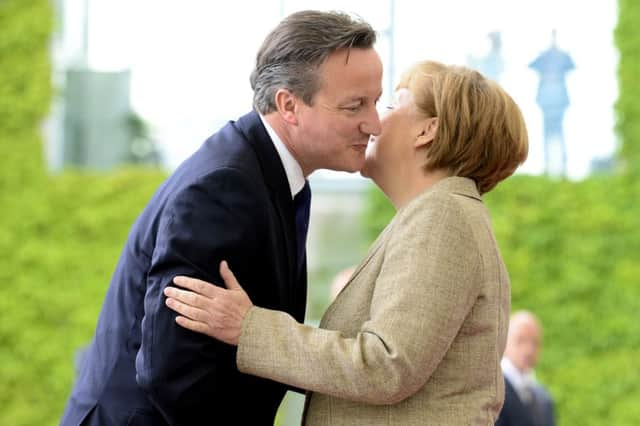EU reform: Where there’s a will there’s a way, says Merkel


In a significant boost to Prime Minister David Cameron’s bid to reform the European Union, the German chancellor did not rule out treaty change following talks between the two.
Germany has “clear cut hope” that Britain will remain a member of the EU but negotiations are set to be “protracted”, she said after the talks in Berlin.
Advertisement
Hide AdAdvertisement
Hide AdMs Merkel said: “Of course we have the desire to work very closely together. We would like to be a part of the process that is going on in Great Britain at the moment and we would like to be a constructive partner in this process.
“I have also said wherever there is a desire, there’s also a way, and this should be our guiding principle here as well.”
The talks marked the end of Mr Cameron’s whirlwind tour of European capitals to secure support for his renegotiation bid.
He said: “Of course there is no magic, quick solution, but as the chancellor has said on this previously, and again today, where there’s a will there is a way.
“The European Union has shown before that when one of its member states has a problem that needs sorting out, it can be flexible enough to do so, and I have every confidence that it will do so again.
“The European Union is better off with the United Kingdom as a member and I believe that Britain’s national interest can best be served by staying in the European Union on the basis of a reformed settlement.
“That is what we both want to happen and that is what we will work together in the coming months to achieve.”
Mr Cameron believes treaty change is required in order to deliver real reform in key areas such as welfare, but France and Germany have previously been cool about such a move.
Advertisement
Hide AdAdvertisement
Hide AdMs Merkel said she was sure they would find common ground with Britain over the reforms of the single market “very quickly” and left open the possibility of treaty change.
She said: “Is it necessary to change the treaty? Can it be changed via a secondary process? If you are convinced of the content or the substance then we shouldn’t be saying ‘to change the treaty is totally impossible’.”
Mr Cameron said he was “heartened” by the German leader’s comments.
He said: “What matters is the content, the substance of what needs to change.
“My view is clear – the substance requires changes to the treaty, but let’s get this substance sorted out first, discuss that and then move ahead and move on and make the changes that are necessary.
“I was very heartened by what the chancellor said in terms of where there is a will there is a way, and if content requires changes in treaties, then you can’t let that stand in the way of what needs to be done.
“I’m clear that the outcome, what we want here, is the changes that address the concerns that people have.”
In an earlier meeting with his Polish counterpart, the Prime Minister failed to secure support for his plans to restrict benefits for migrant workers.
Advertisement
Hide AdAdvertisement
Hide AdNo 10 said Mr Cameron and Ewa Kopacz found “much they could agree on” during talks in Warsaw but plans for benefit reforms “should be discussed further”.
Poland has repeatedly condemned proposals to curb welfare for migrant workers as “discriminatory” and pledged to block them.